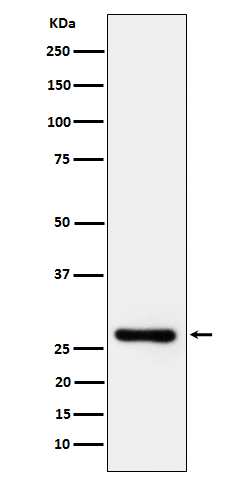DcR1 / CD263 Antibody
Rabbit mAb
- SPECIFICATION
- CITATIONS
- PROTOCOLS
- BACKGROUND

Application
| WB, ICC |
|---|---|
| Primary Accession | O14798 |
| Reactivity | Rat |
| Clonality | Monoclonal |
| Other Names | CD263; DCR1; Decoy Receptor 1; LIT; TRAILR3; TRID; |
| Isotype | Rabbit IgG |
| Host | Rabbit |
| Calculated MW | 27407 Da |
| Dilution | WB 1:500~1:2000 ICC/IF 1:50~1:200 |
|---|---|
| Purification | Affinity-chromatography |
| Immunogen | A synthesized peptide derived from human DcR1 / CD263 |
| Description | DcR1/TRAIL-R3 / TRID / LIT is one of the two putative decoy receptors identified for TRAIL, one of the members of TNF family of apoptosis inducing proteins. |
| Storage Condition and Buffer | Rabbit IgG in phosphate buffered saline , pH 7.4, 150mM NaCl, 0.02% sodium azide and 50% glycerol. Store at +4°C short term. Store at -20°C long term. Avoid freeze / thaw cycle. |
| Name | TNFRSF10C |
|---|---|
| Synonyms | DCR1, LIT, TRAILR3, TRID |
| Function | Receptor for the cytotoxic ligand TRAIL. Lacks a cytoplasmic death domain and hence is not capable of inducing apoptosis. May protect cells against TRAIL mediated apoptosis by competing with TRAIL- R1 and R2 for binding to the ligand. |
| Cellular Location | Cell membrane; Lipid-anchor, GPI-anchor. |
| Tissue Location | Higher expression in normal tissues than in tumor cell lines. Highly expressed in peripheral blood lymphocytes, spleen, skeletal muscle, placenta, lung and heart |

Thousands of laboratories across the world have published research that depended on the performance of antibodies from Abcepta to advance their research. Check out links to articles that cite our products in major peer-reviewed journals, organized by research category.
info@abcepta.com, and receive a free "I Love Antibodies" mug.
Provided below are standard protocols that you may find useful for product applications.
If you have used an Abcepta product and would like to share how it has performed, please click on the "Submit Review" button and provide the requested information. Our staff will examine and post your review and contact you if needed.
If you have any additional inquiries please email technical services at tech@abcepta.com.













 Foundational characteristics of cancer include proliferation, angiogenesis, migration, evasion of apoptosis, and cellular immortality. Find key markers for these cellular processes and antibodies to detect them.
Foundational characteristics of cancer include proliferation, angiogenesis, migration, evasion of apoptosis, and cellular immortality. Find key markers for these cellular processes and antibodies to detect them. The SUMOplot™ Analysis Program predicts and scores sumoylation sites in your protein. SUMOylation is a post-translational modification involved in various cellular processes, such as nuclear-cytosolic transport, transcriptional regulation, apoptosis, protein stability, response to stress, and progression through the cell cycle.
The SUMOplot™ Analysis Program predicts and scores sumoylation sites in your protein. SUMOylation is a post-translational modification involved in various cellular processes, such as nuclear-cytosolic transport, transcriptional regulation, apoptosis, protein stability, response to stress, and progression through the cell cycle. The Autophagy Receptor Motif Plotter predicts and scores autophagy receptor binding sites in your protein. Identifying proteins connected to this pathway is critical to understanding the role of autophagy in physiological as well as pathological processes such as development, differentiation, neurodegenerative diseases, stress, infection, and cancer.
The Autophagy Receptor Motif Plotter predicts and scores autophagy receptor binding sites in your protein. Identifying proteins connected to this pathway is critical to understanding the role of autophagy in physiological as well as pathological processes such as development, differentiation, neurodegenerative diseases, stress, infection, and cancer.


